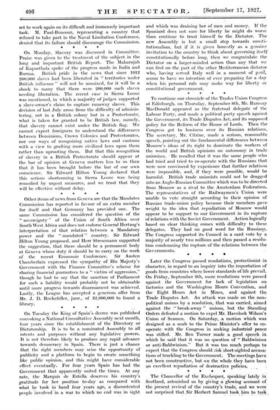To continue our chronicle of the Trades Union Congress at
Edinburgh, on Thursday, September 8th, Mr. Ramsay MacDonald appeared as the fraternal delegate of the Labour Party, and made a political party speech against the Government, its Trade Disputes Act, and its supposed policy for the Reform of the House of Lords. Then the Congress got to business over its Russian relations. The secretary, Mr. Citrine, made a serious, reasonable speech, pointing out the fundamental differences between Moscow's ideas of its right to dominate the workers of the world and British opinions on autonomy in trade unionism. ' He recalled that it was the same people who had tried and tried to co-operate with the Russians that were now convinced by experience that further relations were impossible, and, if they were possible, would be harmful. British trade unionists could not be dragged into an Anglo-Russian Committee which was to be directed from Moscow as a rival to the Amsterdam Federation. The representatives of the Railwaymen's Union were unable to vote straight according to their opinion of Russian trade-union policy because their members gave weight to the idea that repudiation of Moscow would appear to be support to our Government in its rupture of relations with the Soviet Government. Action logically based on clear thinking comes with difficulty to these delegates. They had no good word for the Russians. The Congress supported its Council in a card vote by a majority of nearly two millions and then passed a resolu- tion condemning the rupture of the relations between the Governments. * *














































 Previous page
Previous page